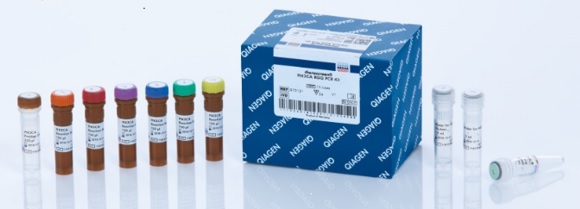The therascreen PIK3CA RGQ PCR Kit - P190001 and P190004
This is a brief overview of information related to FDA's approval to market this product. See the links below to the Summary of Safety and Effectiveness Data (SSED) and product labeling for more complete information on this product, its indications for use, and the basis for FDA's approval.
Product Name: The therascreen PIK3CA RGQ PCR Kit
PMA Applicant: QIAGEN GmbH
Address: QIAGEN Strasse 1, 40724 Hilden, Germany
Approval Date: May 24, 2019
Approval Letter: Approval Order: P190001 - Approval Order: P190004
What is it? The therascreen® PIK3CA RGQ PCR Kit is a laboratory test doctors use to detect 11 mutations in the PIK3CA gene in tumor tissue or in the colorless fluid part of blood (plasma) from patients with advanced or metastatic breast cancer. In breast cancer tissue, mutations in the PIK3CA gene causes an altered form of the PIK3CA protein and result in abnormal functioning of the protein. Identifying these mutations will help patients with breast cancer get a personalized treatment that target these genetic changes.
PIQRAY® (alpelisib) is a drug used to treat patients with breast cancer. The presence of PIK3CA mutations in cancer tissue or plasma from patients with breast cancer is linked with response to treatment with PIQRAY® (alpelisib). The therascreen® PIK3CA RGQ PCR Kit laboratory test helps doctors identify patients with advanced or metastatic breast cancer who should be treated with PIQRAY®.
How does it work?
When testing cancer tissue:
The doctor takes a small amount of cancer tissue from a patient's tumor and sends it to a lab. The lab puts the piece into wax and cuts a thin slide of it. The lab uses the slice for this test. DNA is isolated from a patient's tumor cells and mixed with a substance used in chemical analysis (reagents) that specifically detect and analyze the DNA sequences of the tumor's PIK3CA gene to evaluate the presence or absence of mutations. A trained medical professional reviews the results, and then a report is sent to the ordering doctor. The doctor uses this information to help manage breast cancer patients. The presence of a mutation in the PIK3CA gene in a patient's cancer tissue indicates that a patient with advanced or metastatic breast cancer is eligible for treatment with PIQRAY®.
When testing plasma:
Breast cancer tumors shed tumor DNA into circulation. Specific mutations present in this circulating tumor DNA (ctDNA) can be detected from blood specimens (also called liquid biopsy). The doctor takes a tube of blood from a patient with breast cancer. The blood is spun to separate the blood cells from the plasma portion. ctDNA is isolated from a patient's plasma specimen and mixed with reagents specifically to detect and analyze the DNA sequences of the tumor's PIK3CA gene to evaluate the presence or absence of mutations. The doctor uses the information from testing a patient's plasma to help manage breast cancer patient treatment. The presence of a mutation in the PIK3CA gene in a patient's plasma indicates that a patient with advanced or metastatic breast cancer is eligible for treatment with PIQRAY. If PIK3CA mutations are not detected in the plasma specimens of breast cancer patients, then the patient's eligibility for treatment with PIQRAY should be determined by testing their tumor tissue specimen.
When is it used? The therascreen® PIK3CA RGQ PCR Kit is used to determine if a patient with advanced or metastatic breast cancer might be a candidate for PIQRAY®.
What will it accomplish? The therascreen PIK3CA RGQ PCR Kit helps to determine whether patients with advanced or metastatic breast cancer should be considered for treatment with PIQRAY® treatment.
When should it not be used? There are no known contraindications.
Additional information (including warnings, precautions, and adverse events):

